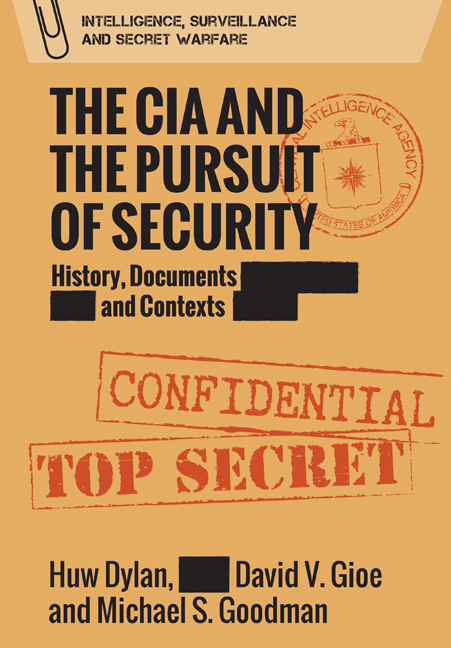Book contents
- Frontmatter
- Contents
- List of Documents
- Foreword
- Acknowledgements
- Introduction
- 1 Intelligence for an American Century: Creating the CIA
- 2 The Development of CIA Covert Action
- 3 A ‘Gangster Act’: The Berlin Tunnel
- 4 The CIA and the USSR: The Challenge of Understanding the Soviet Threat
- 5 Anglo-American Intelligence Liaison and the Outbreak of the Korean War
- 6 The CIA and the Bomber and Missile Gap
- 7 The CIA and Cuba: The Bay of Pigs and the Cuban Missile Crisis
- 8 The CIA in Vietnam
- 9 The CIA and Arms Control
- 10 The CIA’s Counter-Intelligence Conundrum: The Case of Yuri Nosenko
- 11 1975: The Year of the ‘Intelligence Wars’
- 12 Watching Khomeini
- 13 The CIA and the Soviet Invasion of Afghanistan
- 14 Martial Law in Poland
- 15 Able Archer and the NATO War Scare
- 16 The Soviet Leadership and Kremlinology in the 1980s
- 17 The CIA and the (First) Persian Gulf War
- 18 A Mole in Their Midst: The CIA and Aldrich Ames
- 19 ‘The System was Blinking Red’: The Peace Dividend and the Road to 9/11
- 20 Reckoning and Redemption: The 9/11 Commission, the Director of National Intelligence and the CIA at War
- 21 The ‘Slam Dunk’: The CIA and the Invasion of Iraq
- 22 The Terrorist Hunters Become Political Quarry: The CIA and Rendition, Detention and Interrogation
- 23 Innovation at the CIA: From Sputnik to Silicon Valley and Venona to Vault 7
- 24 Entering the Electoral Fray: The CIA and Russian Meddling in the 2016 Election
- 25 Flying Blind? The CIA and the Trump Administration
- Bibliography
- Index
Introduction
Published online by Cambridge University Press: 24 September 2020
- Frontmatter
- Contents
- List of Documents
- Foreword
- Acknowledgements
- Introduction
- 1 Intelligence for an American Century: Creating the CIA
- 2 The Development of CIA Covert Action
- 3 A ‘Gangster Act’: The Berlin Tunnel
- 4 The CIA and the USSR: The Challenge of Understanding the Soviet Threat
- 5 Anglo-American Intelligence Liaison and the Outbreak of the Korean War
- 6 The CIA and the Bomber and Missile Gap
- 7 The CIA and Cuba: The Bay of Pigs and the Cuban Missile Crisis
- 8 The CIA in Vietnam
- 9 The CIA and Arms Control
- 10 The CIA’s Counter-Intelligence Conundrum: The Case of Yuri Nosenko
- 11 1975: The Year of the ‘Intelligence Wars’
- 12 Watching Khomeini
- 13 The CIA and the Soviet Invasion of Afghanistan
- 14 Martial Law in Poland
- 15 Able Archer and the NATO War Scare
- 16 The Soviet Leadership and Kremlinology in the 1980s
- 17 The CIA and the (First) Persian Gulf War
- 18 A Mole in Their Midst: The CIA and Aldrich Ames
- 19 ‘The System was Blinking Red’: The Peace Dividend and the Road to 9/11
- 20 Reckoning and Redemption: The 9/11 Commission, the Director of National Intelligence and the CIA at War
- 21 The ‘Slam Dunk’: The CIA and the Invasion of Iraq
- 22 The Terrorist Hunters Become Political Quarry: The CIA and Rendition, Detention and Interrogation
- 23 Innovation at the CIA: From Sputnik to Silicon Valley and Venona to Vault 7
- 24 Entering the Electoral Fray: The CIA and Russian Meddling in the 2016 Election
- 25 Flying Blind? The CIA and the Trump Administration
- Bibliography
- Index
Summary
‘The essential skill of a secret service is to get things done secretly and deniably.’
John Bruce Lockhart, a former Deputy Chief of the Secret Intelligence ServicePerhaps surprisingly for an organisation carapaced in secrecy, the Central Intelligence Agency (CIA) is one of the best-known institutions around the world. Its activities since its creation in 1947 have had a global resonance; they have occasionally generated internal controversy and strife in the US; they have left a substantial mark in popular culture. Famous (or infamous) though it is, however, the CIA is a profoundly misunderstood organisation. Myths and conspiracies have surrounded the agency since its earliest days, and these have blossomed over the decades. Fact and fiction coexist and are tightly interwoven in the public imagination concerning the CIA. The facts are often more fascinating than the myths.
What are the facts; what feeds the fiction? It is a global agency with a worldwide mission, chartered to prevent strategic surprise and support American policymaking by narrowing the cone of uncertainty for the president and the executive branch, and the armed forces they command. The CIA fulfils this responsibility by collecting, analysing, assessing and disseminating intelligence gathered though all sources to its customers in government. It recruits spies in foreign countries, it manages a substantial technical intelligence capacity, it processes publicly available information to supplement classified collection efforts; it is home to enough subject matter experts in the form of linguists, area studies specialists, psychologists and technical experts to staff a university; it maintains myriad liaison relationships with partner intelligence services all over the world; it maintains a paramilitary capability and undertakes disruptive, covert actions when ordered to do so. But, primarily, it is an agency concerned with gathering and processing secret intelligence and using it to enable US political and military leaders to make more effective policy choices. Despite its fame, it is a very secretive agency.
Myths and conspiracies feed upon secrecy, certainly. But the CIA’s activities have also generated plenty of supplementary fodder. Intelligence services are more than mechanisms for intelligence collection and analysis; they also serve as foreign policy tools, undertaking deniable, yet often visible, action to influence world events on behalf of their governments.
- Type
- Chapter
- Information
- The CIA and the Pursuit of SecurityHistory, Documents and Contexts, pp. 1 - 7Publisher: Edinburgh University PressPrint publication year: 2020



